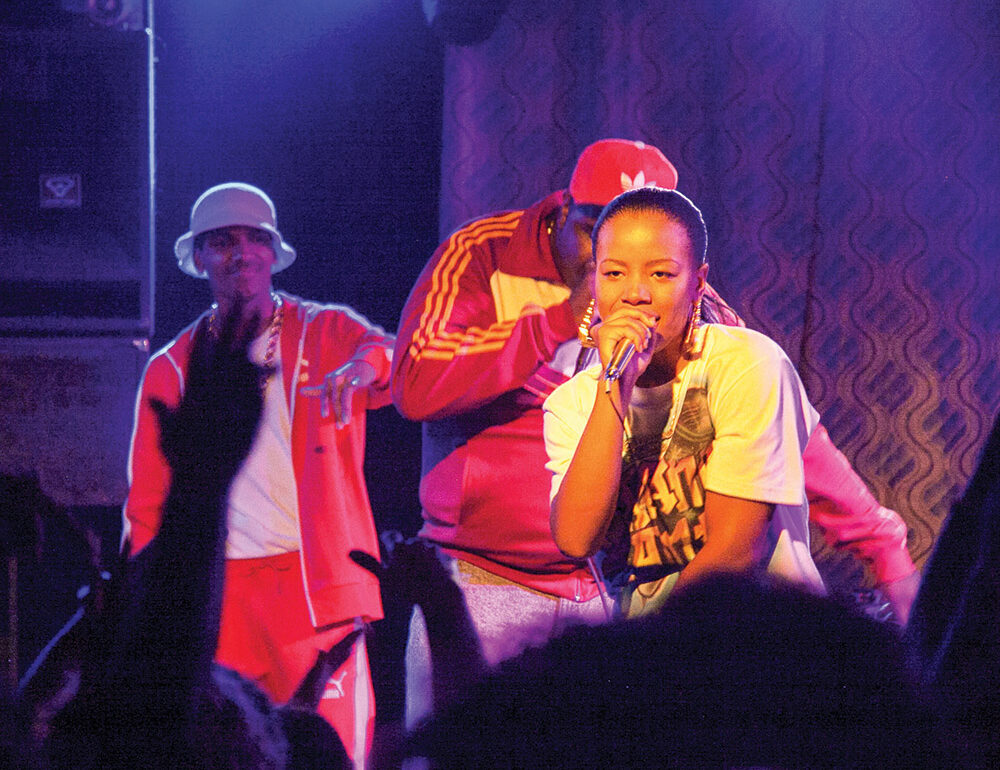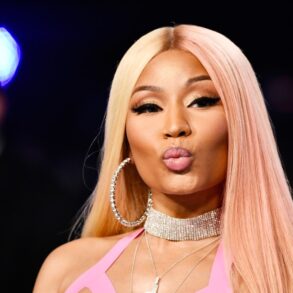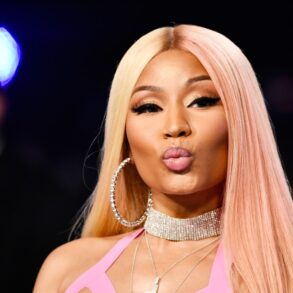In her new single, “Cobra,” Megan Thee Stallion articulates a familiar condition for Black women rappers: “Breaking down and I had the whole world watchin’ / But the worst part is really who watched me?”
The artist is referring to how she felt — famous but lonely, simultaneously scrutinized and disregarded — after another rapper, Tory Lanez, shot her in 2020. A trial thrust Megan Thee Stallion into the spotlight, where an unforgiving public tore apart her testimony and questioned her character. A judge sentenced Lanez to 10 years in prison, but Megan Thee Stallion’s experience highlights a tension faced by many Black women in hip-hop: They may no longer be ignored, but are they truly seen?
Hip-hop turned 50 this year, a glorious milestone for a movement born on the streets of the Bronx. Once dismissed by mainstream media outlets and feared by such politicians as George H.W. Bush and Bill Clinton, the genre is enjoying a golden anniversary that includes recognition of its oldest players and praise for its new pupils.
A significant focus has been on women. Missy Elliott became the first female rapper inducted into the Rock & Roll Hall of Fame, while critics have spotlighted female newcomers (from GloRilla to Flo Milli) pushing the genre’s boundaries. The occasion has indeed presented an opportunity to assess, or reassess, the place of Black women within the art form and the industry.
Accordingly, a small but essential handful of films and TV shows released this year wrestle with the way women in hip-hop have been both invisible players and hypervisible subjects — sometimes evolving from the former to the latter, and sometimes, as “Cobra” evokes, facing both fates at once. The Netflix docuseries Ladies First: A Story of Women in Hip-Hop surveys the genre’s past, reframing it through testimonies of the women who helped make it happen. Issa Rae’s Max series Rap Sh!t, in its second season, dramatizes the grittiness and struggle that characterize Black women’s experience in the business today. And rapper Tierra Whack’s pseudo-documentary Cypher, which premiered Nov. 24 on Hulu, offers a genre-bending exploration of the consequences of the kind of hypervisibility that looks like progress but can also be a curse for female rappers.
When most people think of hip-hop, they conjure images of any number of influential men. If they’re familiar with the women, they might give Salt-N-Pepa a shoutout, too. Writer Joan Morgan, who coined the term “hip-hop feminism” in her 1999 book, When Chickenheads Come Home to Roost, explains this phenomenon at the start of Ladies First: “Women are looked at as these exceptions that made it through this male space, as opposed to the people who make the culture.”
The four-episode Netflix series corrects this record, convening old heads and new charges — scholars, archivists, rappers — to testify to the role women have played and continue to play in hip-hop. In the first episode, Sha-Rock, the genre’s first prominent female MC, talks about the audition that changed her life. She’d go on to form the Funky Four Plus One, the first rap group to perform on SNL.
Roxanne Shanté, whose life was dramatized in the 2017 film Roxanne Roxanne, gets space, too. She credits her mother for encouraging her career; there’s magic to her recounting of a moment when she asked her mom if it was OK to curse during a rap battle. The reply (delivered with a smirk by Nia Long in the film): “I don’t care what you do as long as you win that $50.”
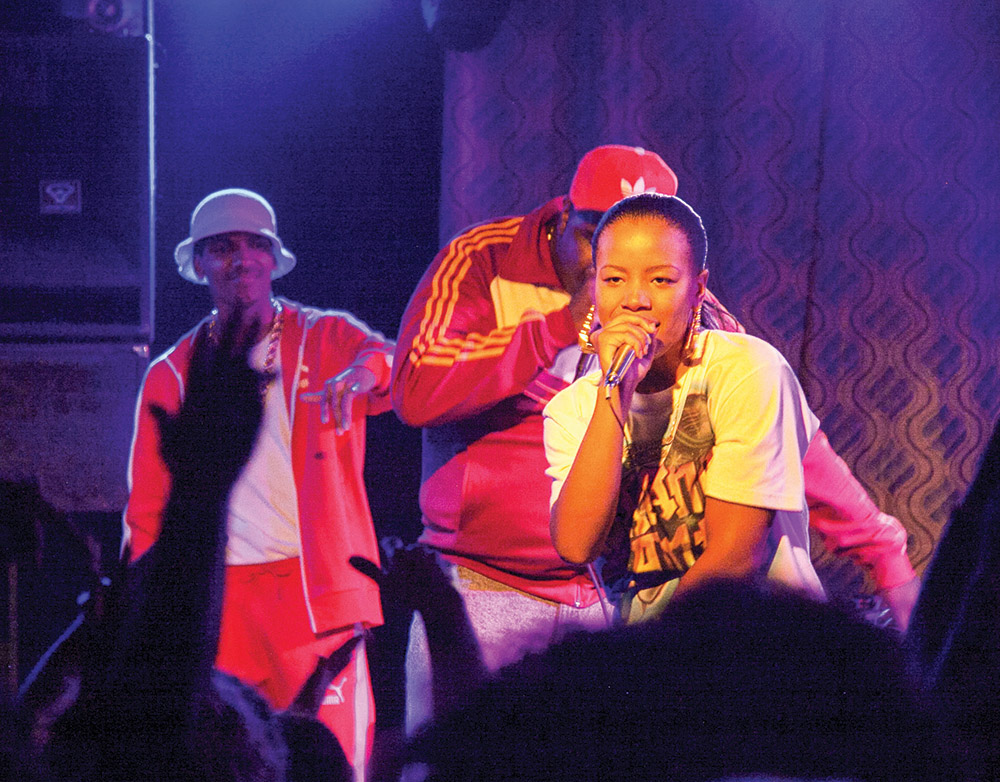
Rapper Chante Adams in the 2017 film Roxanne Roxanne.
Courtesy of Netflix
It’s a privilege to hear and watch these women as they compose a vivid chronicle of hip-hop’s journey from fringe cultural movement to billion-dollar industry. Later episodes tackle how such artists as Queen Latifah and Remy Ma, and those of a younger generation, navigated misogynoir and colorism within the industry.
Those problems extend beyond rappers, as evidenced by interviews with producer Drew Dixon, who appeared in the 2020 doc On the Record accusing mogul Russell Simmons of sexual harassment and rape (which he denied); and Dee Barnes, the rapper and journalist whose career never recovered after she was beaten up by Dr. Dre in 1991. Even the most successful women working in and adjacent to the industry have struggled to secure collaborations, bounce back from setbacks and find professional legitimacy.
Such hardships are depicted in Rap Sh!t as Mia (KaMillion) and Shawna (Aida Osman) confront the disappointments and low-grade violence of the business. The first season was all about self-image, with Shawna torn between writing the conscious raps she loves and conforming to the industry’s ideas of what women rappers should be. She ends up realizing that the choice between integrity and popularity as opposites is a false one — a binary concocted by sexist tastemakers.
After gaining a local following in season one, Mia and Shawna tour with Reina Reign (an offensively appropriative white rapper played by Kat Cunning) for more exposure. It only takes the Miami rappers a couple of episodes into season two (which premiered Nov. 9) to realize the exploitative underside of tours. At one point, their manager, Chastity (Jonica Booth), gives them a reality check: “You can’t keep complaining about everything, damn, ‘this racist, this misogynistic,’ ” she says. “You can keep acting like you’re special and above niggas, or you can play a role and keep it pushing like everybody else.”
But haven’t they always been playing a role? Rap Sh!t offers one of the most potent portrayals to date of how much the industry is based on image curation. Whether they’re talking to fans on Instagram Live or creating videos for TikTok, the characters’ interactions are heavily mediated by social platforms. Mia and Shawna are always filming their lives. Showing them doing so becomes an especially purposeful narrative and stylistic technique in season two, when the chasm between their personal problems and their online image widens.
Whack’s Cypher explores the fallout from this kind of relentlessly aimed and self-aimed spotlight. The Philly-based artist is part of a cohort of young women rappers renegotiating the terms on which the world sees them. Their work celebrates their sexual liberation and quirky individuality but also engages with trauma and forces audiences to consider their humanity.
Directed by Chris Moukarbel, Cypher begins as a dutiful portrait of Whack’s ascendancy and an introduction to her personality — that wry sense of humor and penchant for trolling. It opens with archival videos of the artist’s underground days and a narrative of her childhood. Her foray into hip-hop began with poetry, a transition that’s been represented in films like Radha Blank’s The Forty-Year-Old Version (2020) and Sanaa Lathan’s directorial debut, On the Come Up (2022). Many of the emcees interviewed in Ladies First likewise locate their beginnings in poetry.
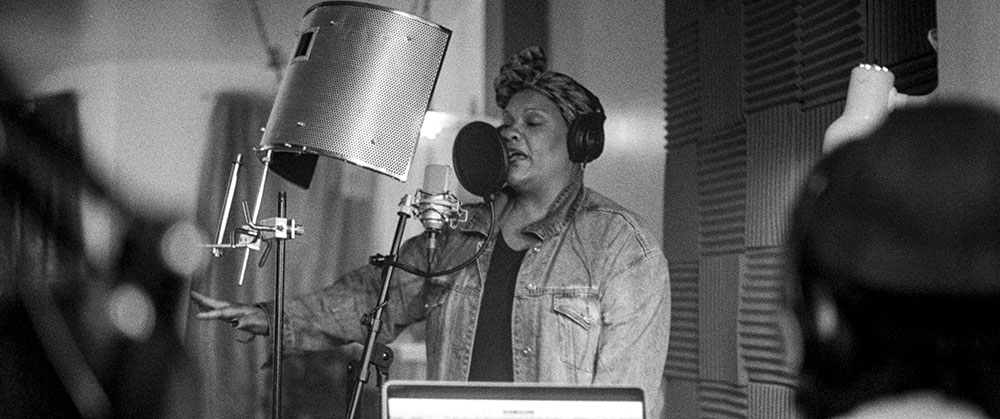
Radha Blank in The Forty-Year-Old Version.
Jeong Park/Netflix Courtesy Everett Collection
A class assignment inspired Whack’s first poem, which she recited to her peers. “The class went crazy, the teacher went crazy,” Whack recounts. Other students approached her: “We heard you be rapping,” they would say, the statement landing as both an invitation and a challenge.
Like the characters on Rap Sh!t and peers like Megan Thee Stallion, Whack is honest about the perils of hypervisibility. Cypher covers her rise to stardom and illustrates how the artist used her album Whack World, a 15-minute audiovisual project released on YouTube in 2018, to court attention. She crafted an artistic persona of neon colors and maximalist outfits, a surrealist mélange that dared audiences to look.
At the same time, Whack tries to maintain boundaries, to keep parts of herself hidden. Personal biography is not an integral part of the package. That’s what makes the direction Cypher takes so intriguing: It’s both a peek into her life and a deliberate affront to typical celebrity artist documentaries.
Just as viewers settle into the film, it shape-shifts into a strange fictional narrative reminiscent of Janine Nabers and Donald Glover’s Swarm, an Amazon show centered on a fanatic (Dominique Fishback) devoted to a Beyoncé-coded pop star. After a grueling show, Whack and her team recoup at a diner, where they meet an obsessive fan determined to share her theories about celebrity, pop culture and Whack’s destiny. When the fan dies (offscreen), Whack and her team become suspects in the investigation and entangled in an internet conspiracy accusing the artist of murder.
A conventional doc would have worked its way through Whack’s life, ending on an upbeat note about her future. It might have detailed personal matters and contextualized her journey in relation to other Black women artists. Cypher chooses, rather, to probe the issue of narrative authority, casting doubt on who’s documenting whom. The deeper Whack and her film crew burrow into the mystery, the more they realize that they too are being observed. (They discover cameras planted in their hotel rooms and footage of private meetings.) In a world where nearly everyone has the means to record everyone else, to whom do our stories actually belong?
It’s a heady existential question, but one Black women in hip-hop have been forced to grapple with for decades as they wade through narratives built on assumptions about their skills, their integrity, their innocence or guilt. In many ways, it’s the query at the very heart of these 50th anniversary celebrations, which have allowed us to see female rappers and to consider how we see them. In hip-hop, as in life, women are the past, the present and the future.
This story first appeared in the Nov. 29 issue of The Hollywood Reporter magazine. Click here to subscribe.
This post was originally published on this site be sure to check out more of their content.



